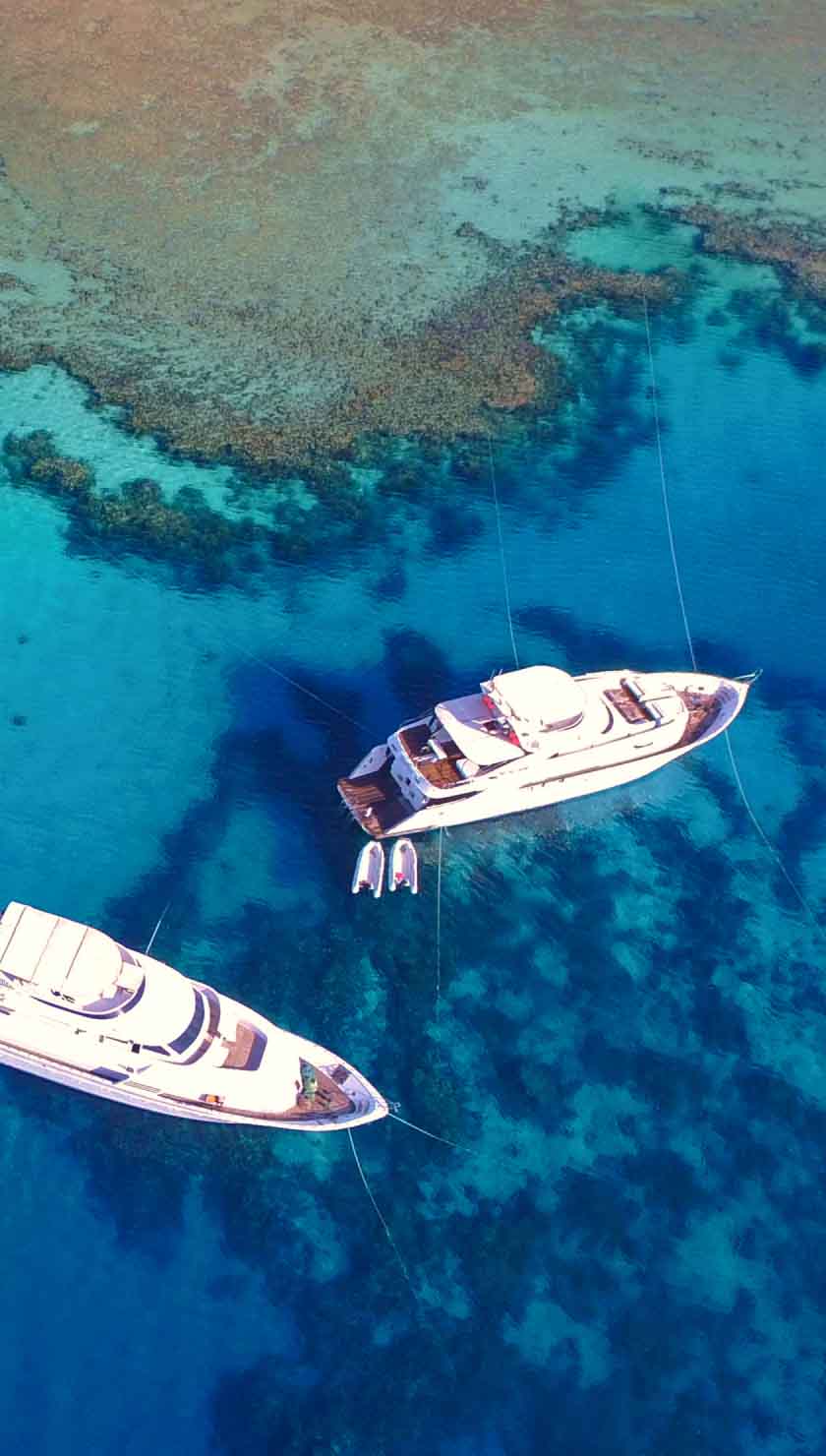Djibouti dive areas have a lot to offer; from October to February you will have the chance to see Whale Sharks, as the waters are much more plankton rich during this time, and year round you will run into manta rays, pilot whales, grey sharks, nurse sharks and some playful sharks who love to swim alongside the boats. Over 200 species of corals have been identified on this coral reef which means an extremely diverse ecosystem for divers to enjoy. You will do approximately 3 dives per day on this dive tour.
DIVE SITES AND AREAS IN DJIBOUTI
There are four main dive areas in Djibouti, all which have multiple dive sites of their own and all which provide divers with unique underwater adventures.
Moucha Island: This island is part of a group of islands located only 11km (7 mi) off the coast of Djibouti and provides divers with multiple dive sites which range from easy to expert. Here the check dive (the dive where the boat staff analyse your diving capabilities) is done at the beginning of each Djibouti liveaboard tour. It will give you a chance to dive in some crystal clear waters and even some wrecks for the more experienced divers.
Seven Brothers Islands - This is a group of seven uninhabited islands located off of the east coast of the horn of Africa, in the Bab-el-Mandeb Strait. Some of the dive sites include a shallower dive site ranging for 5m – 20m (15ft – 60ft) meaning it is accessible for divers of all certifications, including snorkelers while others are reserved for the more experienced divers, including a wreck as well. In general, these dive sites here are an underwater photographers heaven when so many species of corals and their inhabitants to capture.
Gulf of Tadjourah - This is a basin within the horn of Africa that lies at the entrance of the Red Sea. This is one of the more popular diving and snorkeling areas, with dive sites ranging from 5 metres (15 ft) deep down to 30 metres (90 ft) deep. It has a flourishing reef for everyone's enjoyment. There are also dive sites which are sea walls and which have caves to dive through. Many species of sharks have been spotted here in the past, swimming gracefully through the rainbow colours of the coral reef.
Ghoubet al Kharab - also known as the Devils Goblet, this is a bay which connects to the open ocean as well as the Gulf of Tadjourah and here there are two extremes; incredibly deep waters which can plummet down to almost 200m (600ft) and these waters are surrounded by high mountains, and overall impressive site to see. It is part of the junction between the African and Arabian continental plates. There are deep waters and strong currents here, but definitely a stunning dive to experience, here you will see large fish including different species of sharks who let themselves be swept by the current. There are also underwater volcanic islands which you can dive around. Another popular dive site here is also ‘The Crack’ a literal crack between three tectonic plates and there is a certain level of excitement when descending between these massive structures.
WHEN TO GO
The liveaboard safaris that are offered on LiveAboard.com usually run from October until the end of May/early June, mostly due to weather reasons as in July and August there is the most rain, affecting visibility and opportunities to dive. In general the climate here is warm and humid, with October to April being the coolers months, and therefore the most pleasant.
TIPS FOR TRAVELLERS
Liveaboards will have equipment for rent, however bringing your own will save renting costs and is always more comfortable. The staff will need to be sure about your dive experience so remember to bring along your log book and certification cards.
There are three main languages which are spoken in Djibouti; French, Arabic and Somali, however, in the more touristy places there will be people who speak English and the liveaboard staff will also speak English.
The currency which they use here is the Djiboutian Franc, the exchange rate is 196 Franc for 1 Euro.
The electricity plugs which are used ae the standard European two round pong plugs; type C / E with a voltage of 220 volts.
HOW TO GET THERE
Djibouti has its own international airport; Djibouti Ambouli International Airport, from here flights depart to all the neighbouring countries, Paris, Istanbul, Dubai, Egypt, Saudi Arabia and Madagascar. It is located in the town of Ambouli and only 6km (5mi) from the city centre.
The liveaboards depart from the Djibouti Marina.
CONSIDERATIONS
The price range of the liveaboards which we offer on LiveAboard.com range from 160-200 Euros a night. Some of the extra costs which could occur involve dive gear rental, if needed, dive insurance, which is mandatory to have before joining our trips and lastly if you are an Open Water diver you will need to pay an extra fee for guiding. You can join our liveaboard safaris as a snorkeler and as a diver you will need to be Open Water Certified with at least 20 logged dives.
When it comes to health and vaccinations it is recommended to have your Yellow fever and Typhoid vaccinations and also Malaria is a risk here Please always consult a medical professional before travelling.
An untouched paradise with crystal-clear waters and a host of pelagic life. Divers can see dolphins, mantas, sharks, whales and due to the fertile waters around the volcanic islands, whale sharks can be seen from October to February.











